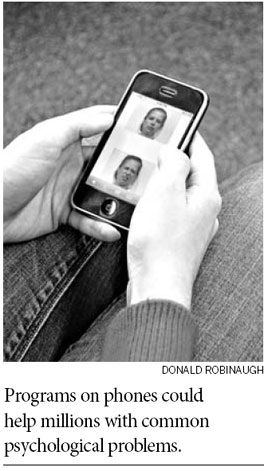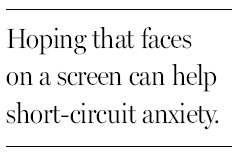Therapy anytime via phone app
Updated: 2012-03-04 07:49
By Benedict Carey(The New York Times)
|
|||||||||
In the past few years researchers have been testing simple video-game-like programs aimed at relieving common problems like anxiety and depression. Recent results have been encouraging enough that the programs are being delivered on smartphones " therapy apps that may soon make psychological help accessible anytime, anywhere.
Well-designed apps could reach millions of people unable to engage in traditional therapy.

Some experts are wary. "We are built as human beings to figure out our place in the world, to construct a narrative in the context of a relationship that gives meaning to our lives," said Dr. Andrew J. Gerber, a psychiatrist at Columbia University in New York. "I would be wary of treatments that don't allow for that."
Richard McNally, a psychologist at Harvard University who recently completed a study of 338 people using a program on their smartphones, was hopeful, but noted, "There are big questions about how it could work, and how robust the effect really is."
The smartphone study is part of an approach called cognitive bias modification, which seeks to break some of the brain's bad habits. The premise was pioneered by Colin MacLeod of the University of Western Australia.
Take social anxiety. Studies find that many with the condition fixate subconsciously on hostile faces in a crowd of people with mostly relaxed expressions.
Reducing that bias can interrupt the cascade of thoughts and feelings that normally follow, short-circuiting anxiety, studies suggest. In one program, people see two faces on the screen, one with a neutral expression and one hostile. The faces are stacked. A second later they disappear, and a letter flashes on the screen, in either the top half or the bottom.
Users push a button to identify the letter, but this is meaningless; the object is to snap the eyes away from the hostile face, conditioning the brain to ignore it. Repeated practice may train the eyes to automatically look away, or the frontal areas of the brain to exercise more top-down control.
"I just did it when commuting to work on the subway," "It's a little boring, because it's repetitive, but you're only doing it for a few minutes a few times a day," said Stefanie Block, 26, a graduate student who took part in the study.
A study of 40 children with anxiety, published in December, found that an attention bias program produced "significant reductions in the number of anxiety symptoms and symptom severity," according to the authors.
Psychologists in Europe have tried a bias modification program aimed at heavy drinking " in which people push away computer images of alcoholic drinks, using a joystick, and zoom in on nonalcoholic ones " and found that it improved the effectiveness of talk therapy aimed at reducing the habit.

Others are skeptical. "I am far from convinced that this is for real," said Willem Van der Does, a psychologist at Leiden University in the Netherlands.
"I did not notice any positive effect," one woman with social anxiety who participated in the Harvard study said in an e-mail. "It seemed similar to when I played Scramble or other games on my phone."
In the largest study to date, researchers began recruiting participants in 2010, using Craigslist and online bulletin boards for social anxiety. In March 2011, an article in the Economist magazine mentioned the project, drawing more interest. Months later, after 338 participants with anxiety symptoms completed a total of more than 4,000 sessions of the two-face therapy application, the researchers had some results.
Participants improved their scores on a questionnaire measuring anxiety, dropping by an average of 22 points, compared with an 8-point drop among people in a "waiting list" group, who got no computer games to play. But a placebo group practiced with a two-face video program not intended to shift the eyes from one face or the other, and their anxiety levels also fell by 22 points.
Stranger still, the people who had learned about the study from the Economist responded very well " with either the treatment app or the placebo one.
"We're not exactly excited about that finding," said Phil Enock, a Harvard graduate student who helped conduct the study. "We have no idea what it means."
The New York Times
(China Daily 03/04/2012 page12)